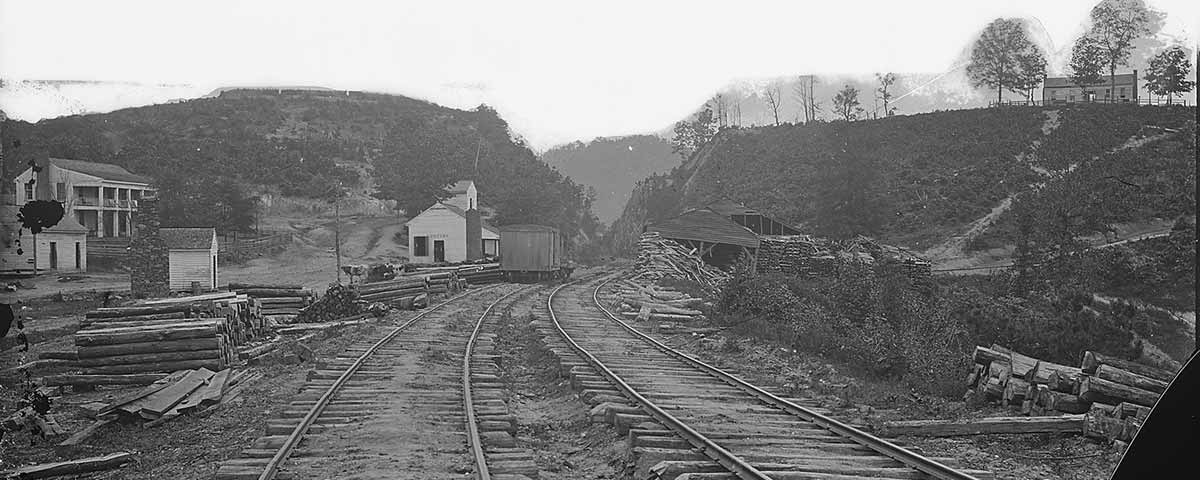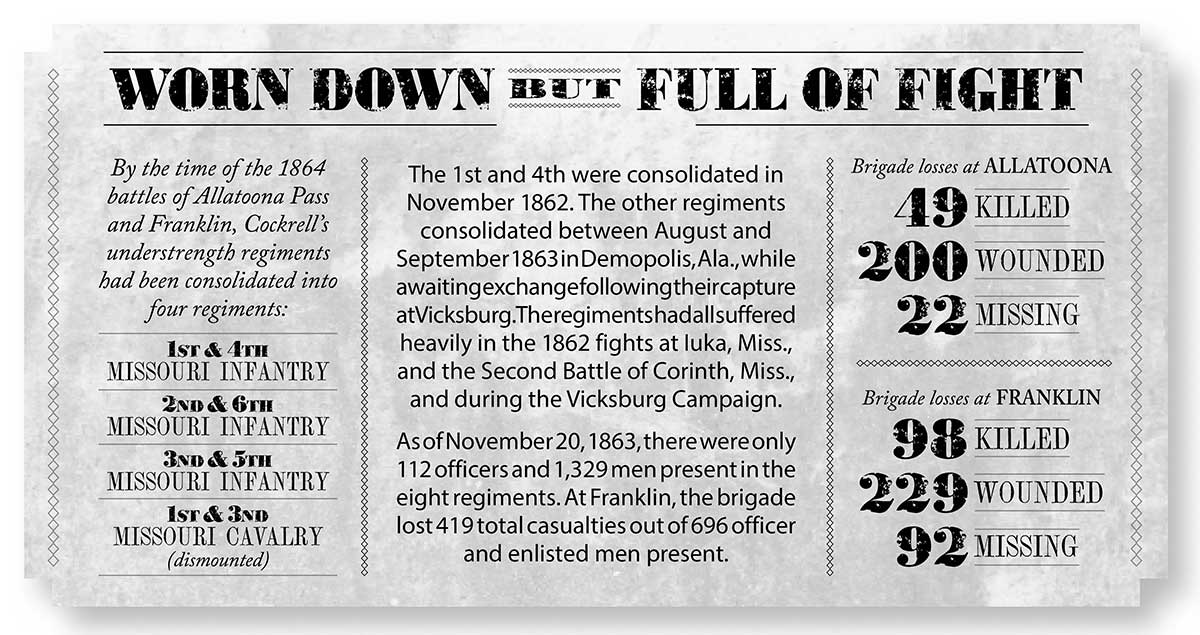The Confederate 1st Missouri Brigade paid a high price at Allatoona Pass and Franklin
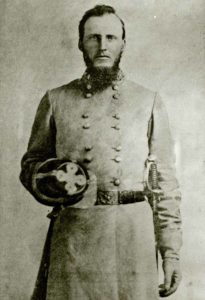
In the foreword to In Deadly Earnest, Phil Gottschalk’s 1991 history of the 1st Missouri Brigade, C.S.A., Ed Bearss, retired Chief Historian of the National Park Service, leader of countless battlefield tours, and member of the Civil War Times advisory board, claims that the Missouri brigade “compiled a combat record that was unsurpassed” in the Civil War. The following two wartime newspaper accounts, reprinted here for the first time, describe two of the Missourians’ costliest engagements, the October 5, 1864, Battle of Allatoona Pass, Ga. and the November 30, 1864, Battle
of Franklin, Tenn.
[dropcap]T[/dropcap]he article on Allatoona Pass appeared in the Wilmington (N.C.) Daily Journal on November 2, 1864, but it had been published previously in an unidentified Mississippi newspaper. Although the writer’s identity is unknown, he indicates that he had served with his regiment since it was part of the Missouri State Guard during the September 1861 siege of Lexington, Mo.
The battle at Allatoona had its origin in a plan adopted by Confederate General John B. Hood following the fall of Atlanta to Union forces. Hood decided to march his Army of Tennessee north to launch attacks against the Federals’ main communication and supply line, the Western & Atlantic Railroad. The Confederate general hoped that this would force Union Maj. Gen. William T. Sherman to withdraw his army from Atlanta to Chattanooga or pursue the Army of Tennessee, in which case the Confederates would withdraw into Northern Alabama. If Sherman chose not to chase Hood and decided instead to march south of Atlanta and head for the Atlantic or Gulf coast, then Hood could pursue and attack the Federals on ground of his choosing.
As related by “Missouri,” Confederate corps commander Lt. Gen. A.P. Stewart detached Maj. Gen. Samuel G. French’s Division on October 4, 1864, to strike Allatoona Pass, a Federal supply depot located where the Western & Atlantic Railroad ran through a 180-foot-deep cut in the Allatoona Mountains. The Federal garrison at Allatoona numbered roughly 2,025 men and occupied a fortified position anchored by two large earthen forts on opposite sides of the railroad cut. During French’s initial assault, the Missourians attacked and overwhelmed an advanced Federal position that became known after the battle as Rowett’s Redoubt. This is where the hand-to-hand fighting took place as noted by “Missouri.” The Federals then retreated into the Star Fort, described in the article as the “strong fort on our right,” which the Yankees held until the Confederates withdrew. Although the battle involved relatively small numbers of men, the casualties sustained on both sides reflect the intensity of the fighting. The Union garrison suffered 707 casualties. French’s Division, which numbered 3,553 men, sustained 898 casualties.
The Fight at Altoona
Wilmington [N.C.] Daily Journal, November 2, 1864
Jacksonville, Ala., Oct. 17, 1864.
Editor Mississippian:
Will you please allow me, through the columns of your paper, to give a short sketch of the battle of Altoona.
On the 3d of October, we, [General Alexander P.] Stewart’s corps, struck the [Western and Atlantic] railroad near Big Shanty. Gen. [Samuel G.] French’s division then went to the right and tore up the track to within three miles of Kennesaw mountain, while Gen. [William W.] Loring’s turned to the left, moving in the direction of Acworth, capturing that place and tearing up the track some distance beyond. On the evening of the 4th, Gen. French was ordered, with his division, to move and attack Altoona at daylight the next morning. The garrison was then supposed to number five thousand. In accordance to orders Gen. French moved that night so as to be near the town by light, and, if possible, surprise the garrison. His division was composed of Generals [Claudius W.] Sears, [William H.] Young and [Francis M.] Cockrell’s brigades, with twelve pieces of artillery.
Before light on the morning of the 5th, we had gained a position on the railroad within three quarters of a mile of the place, and began skirmishing with the enemy. As soon as light began to dawn our column could be dimly seen moving to a position around the enemy’s stronghold. The artillery, supported by a portion of a regiment from the Texas, Young’s brigade, was posted on an eminence south of the town, and the 4th Mississippi regiment, of Sears’ brigade, was detached to attack a block house on one branch of the Hightower river. With the remainder we moved to the north and rear of the enemy’s position, which was now discovered to be very formidable, consisting of strong forts and heavy redoubts running in all directions.
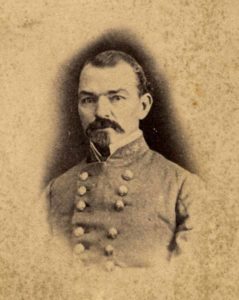
After having secured our position in the rear, in the following order, Gen. Sears to attack and carry a strong fort on our left, and Gen. Cockrell, supported by Gen. Young, to attack and carry the heavy redoubts in front of a most formidable fort on our right. Gen. French dispatched a flag of truce demanding an unconditional surrender within twenty-five minutes. At the expiration of the time allotted them, a boom from their cannon brought the reply. Gen. French was here informed that the enemy had evidently been reinforced. The movement was one day too late, for just before our arrival, five regiments from Rome reached the garrison, already composed of three regiments, amounting in all to a little over three thousand, while our force did not exceed twenty-five hundred men. When Gen. French heard the reply he immediately began to prepare for action—determined to take them by storm. Never in all the contest for freedom have I seen men as anxious for the fray to begin. Every man was confident of victory. The scene now became general and imposing. The golden sun had arisen from behind Altoona’s towering hills, shedding a bright yet solemn lustre upon the surrounding mountain fields, and the silvery dew-drops glistened with clear sunlight, reminded one of the sweet tears shed o’er freedom’s sons.
The word “Attention!” and the little, yet noble band arose to their feet. For a moment then, and all is silent as the grave. The wind ceased to moan through the lofty pines, and all nature seemed to pause in solemn, yet awful grandeur. The “Goddess of Liberty,” dressed in her robe of love, hovers around each heart and whispers courage, braves! And oh! Missourians, Mississippians, and Texans, methinks I see in this awful stillness one last, one lingering look to home and friends; breathe one prayer to Heaven that love ones shall meet again. Yet in our gloom the bright, the lovely hills around the old homestead comes in view. But hear, the silence breaks, and rings along the line, “Forward!” With that yell, characteristic of Missourians, they sprang forward, and the work of death began.
I have followed the army from Lexington to Altoona, but never witnessed such a scene as is now transpiring on Altoona’s bloody hills. The enemy fought like men, and when within twenty yards of their works, so deadly was their fire, that our lines halted, and for a time the contest seemed dreadful. It was here that Major [Owen A.] Waddell, commanding the 3d and 5th Missouri, fell mortally wounded, whilst nobly and exultantly leading his men. Major [Robert J.] Williams, of the 3d, fell severely wounded in the thigh. But another deeper, louder yell from behind, and the cry rang along our lines forward, the “Chubs” are coming, and like the tiger upon his prey, our men leaped upon their works. And now let nature pause and for one moment gaze upon the scene. The cannon’s thunder was no longer heard, the rumble of the musket had ceased, “but shrill and terrible from rank to rank, resounded the clash of bayonets.” The Texans, determined not to be outdone by the Missourians, rushed impetuously forward, and having no bayonets, turned the butts of their guns, or gathering rocks, hurled them upon the falling foe.
[quote style=”boxed” float=”left”]Every man was confident of victory[/quote]
Here fell the noble Stephen Barton, ensign of the 3d and 5th Missouri triumphant over the enemy’s works. Here General Young was severely wounded, while leading his men to the charge. Never was the work of death more terrible, while here friend and foe fell to fill one common grave. The gallant Mississippians came promptly up from the left, and the enemy staggered, reeled and fled, and left us in possession of all the forts and redoubts except the strong fort on our right, to which the enemy now all retired. This fort was the most formidable of all, being surrounded by a deep, wide ditch with no approach but at the draws. Our men were now compelled to rest and get a new supply of ammunition. While this was being done, and preparations were being made to storm and carry the last remaining fort, General French received a dispatch from General [Frank C.] Armstrong, stating that the enemy were advancing 10,000 strong by way of Big Shanty.
This made it necessary to withdraw, for if this was true, before preparations could be made and the victory complete, the enemy would be upon us in our rear. Gen. Cockrell was ordered three times before he would withdraw, and when necessity compelled him, he wept. He met Gen. French with tears in his eyes and the two heroes wept together. Yonder lies some of Missouri’s noblest sons, there flowed some of her purest blood, and shall it all be in vain? But it is our luck. On the eve of one of the brightest victories of the war, we are defeated by a false dispatch, for scarcely had we been withdrawn when Gen. French received a second dispatch stating that no enemy were advancing. But it was now too late, though there was not a man but begged to go back. Considering the odds against us, the enemy out-numbering us, with strong earthworks, and the terrible desperation with which they fought, it was one of the most hard fought battles of the war. I had thought we had done hard fighting before, but there is not a man but will not say it was the hardest fought battle in which he was ever engaged. We never before on any field used the bayonet.
I had forgotten to mention that Major [William F.] Carter, of the 2d Missouri, was killed. Though individual deeds of daring could not be recorded, I must however mention a few. Sergeant [William W.] Rice, of the 3d regiment, after laying three men low at his feet, plunged a bayonet through another’s breast, just in time to save the life of Captain Adkinson of Co. G, of the same regiment, who was leading his men gallantly on; J.J. Payne, belonging to a company of sharpshooters, walked up to a rifle pit containing six Yankees and demanded of them to surrender; all threw down their guns but one. He remarked that six were too many to surrender to one. Well, said hero, leveling his gun, you can do as you please, sir, when he too surrendered, and the six were marched to the rear, our hero carrying with him two heavy rifles. Another, Robert Theaderick, a letter bearer, seeing our men halt in the thickness of the fight, letter in hand, and was severely, if not mortally, wounded. When asked why he rushed into danger, he replied, “I wished to encourage the boys.” I wish I had room for more. The Missouri Brigade lost near two hundred and eighty killed and wounded. I do not know the number lost in the other brigades, but suppose it to be about the same. The loss of the enemy was equally heavy. In killed they lost the most. We captured two flags and about 220 prisoners.
Hoping I have done injustice to no one, I beg leave subscribe myself yours, Missouri.
[dropcap]L[/dropcap]ess than eight weeks after Allatoona, the Missourians under Brig. Gen. Francis M. Cockrell once again faced entrenched Federals at the Battle of Franklin. This bloody engagement is briefly described in the second article from the April 5, 1865, Atlanta Intelligencer that consists of an extract from a private letter written by a defiant Cockrell. During his brigade’s advance against the Federal line in the vicinity of the cotton gin, Cockrell had two horses shot from under him and received wounds in the right arm, the left leg, and the right ankle.
“When I got these wounds,” he recalled years after the war, “I was at the front line right in the midst of the fight. I tried my right leg, and when I found I couldn’t walk on it, I hobbled off the field. It was not until the surgeon was working on my right ankle that I found I had been wounded in my left leg.” Cockrell’s statement that his brigade lost two-thirds of its strength at Franklin roughly coincides with figures that appear in Gottshalk’s In Deadly Earnest, which claims that out of 696 men who participated in the charge, the Missourians suffered 419 total casualties. The Missouri general’s war ended on April 9, 1865, when he was captured along with most of the garrison of Fort Blakely on the Appalachee River near Mobile, Ala.
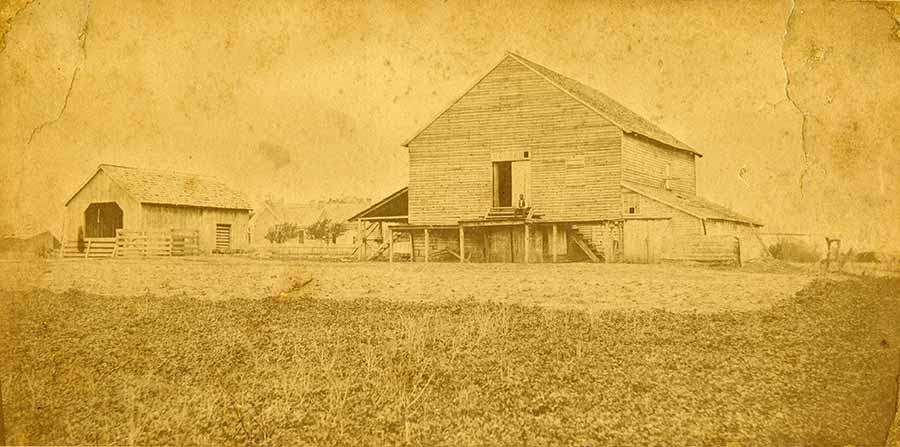
How a True Soldier and Patriot Feels
Atlanta Intelligencer, April 5, 1865
From the Telegraph & Confederate
The Columbus [Ga.] Times has been permitted to make the following extract from a private letter written by General Cockrell to a friend in that city. This officer is a Missourian, and commanded a brigade in French’s division. He has not been at home in four years, but has been constantly in the field except when wounds (of which he has many) compelled his absence. His brigade of Missourians with himself at their head, has won a name that can never die. The letter was written in the freedom of private correspondence, and, of course, was never intended to be published; but the sentiments it utters are so honorable to the author, and are, moreover, so well calculated to inspire faith and hope in the cause, that we trust he will excuse the liberty taken.
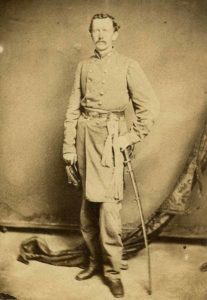
“Since I saw you last, I have gone thro’ a regular flint mill. My noble brigade has been almost obliterated. At Allatoona, Ga., I lost one-third of the number taken into the fight, and at Franklin, Tenn., I lost two-thirds- having had every fourth man killed dead, or mortally wounded, and since died. This was by far the fiercest and bloodiest and hottest battle I have ever been in. My Brigade acted more handsomely, defiantly and recklessly than on any field of the war; and you know what it required to eclipse all former conduct on so many bloody fields. They march quietly, and boldly, and steadily through the broken and fleeing ranks of at least twice their own number, and no man wavered—all to the stop, with colors six paces in front, just like a drill, and never brought their guns from a ‘right shoulder shift’ until within thirty or forty yards of the enemy’s works, and then fired by order, and hurled themselves against the works. It was grand and terrible in the extreme. Almost all were killed and wounded very near the works, or in the ditches of the works. I have no language to paint the scene.
We hear that Colonel [Elijah P.] Gates has escaped the enemy, and is now somewhere in our lines. I hope it is true. He is the noblest and best soldier I ever saw. [Gates was wounded in both arms at Franklin, having one of them amputated. Federals captured him in a field hospital, but he subsequently escaped from the train taking him north.]
I had a rough time getting out of Tennessee, but would have ventured almost anything before falling into Yankee hands. I rejoined my brigade at West Point, Miss., January 20, 1865, just sixty days from the day I was wounded. I have been on crutches up to March 4, 1865. Laid them aside on that day to take an even start with Old Abe for the coming four years. I am in for that time, and four more if necessary- forever if required. We arrived in Mobile February 4th and since then I have commanded French’s division.
[quote style=”boxed” float=”left”]My noble brigade has been almost obliterated[/quote]
I am not well yet. My right leg is still not well. I have six pieces of bone which have worked out, and I think more pieces will yet work out.
I got disgusted with the rear—could scarcely keep from breaking my crutches over the rear men, who talked so loudly of demoralization, peace, etc. I never want any man to gas to me of peace. I don’t think of any such good thing. I think of war—bitter, cruel, devastating war—fully prepared for the worst. I expect Richmond to fall and even when all our large armies are disbanded by force of the enemy—our cities, railroads, and rivers in their possession—then I will just commence fighting in earnest. Will take to the mountains and swamps, and fight on, fight ever. Let us all resolve to do this, and we will be free. Be not overjoyed with victory, and draw new, fresh inspiration from disasters and reverses. Trust in God and our own arms, and all will be right. I firmly believe in our entire ability to maintain our separate nationality and achieve our independence.
Keith Bohannon teaches at the University of West Georgia. His latest essay appears in Gary W. Gallagher and Caroline E. Janney’s Cold Harbor to the Crater (University of North Carolina Press, 2015).

